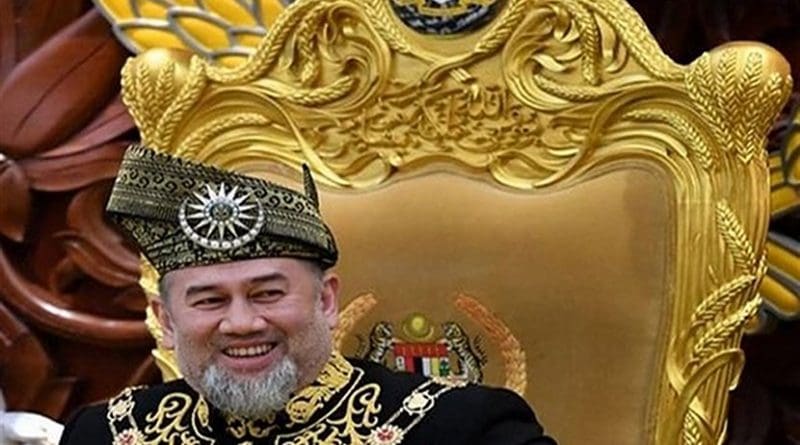Malaysia: Mystery Surrounds Abdication Of King
By BenarNews
By Hadi Azmi and Noah Lee
Malaysian King Sultan Muhammad V stepped down from the throne on Sunday, royal palace officials announced but without stating a reason for the first abdication by one of the country’s monarchs in its 61-year history.
The resignation of the 49-year-old monarch, Malaysia’s 15th king who is the sultan or ruler of Kelantan state, took immediate effect, the palace said in a statement. It gave no details about who would succeed Sultan Muhammad V, who had only ascended to the throne in December 2016 under Malaysia’s rotating system of monarchs.
“The palace would like to inform that Seri Paduka Baginda Tuanku has resigned as the 15th Yang di-Pertuan Agong or the Supreme Ruler of the federation effective January 6 in accordance with Article 32(3) of the Federal Constitution,” said Wan Ahmad Dahlan Abdul Aziz, the comptroller of the Royal Household, referring to the king by his full title in Malay.
The abdication took place following days of reports in regional media speculating that the king might be stepping down after marrying a Russian woman abroad in late November.
The king sent a letter to the secretary of the Conference of Rulers notifying them about his decision to resign from the throne, Wan Ahmad Dahlan said. The conference is Malaysia’s council of nine traditional rulers and four governors. They represent the 13 states in the Malaysian federation, elect a king to a five-year term, and take turns on the throne.
“During his tenure as the Yang di-Pertuan Agong, His Majesty had worked to fulfill his responsibilities and the trust placed in him as the head of state, serving as the pillar of stability, the source of justice and as an umbrella of the solidarity and unity of the people,” the royal comptroller said, adding that Sultan Muhammad V was preparing to return to his home state to “safeguard its people” and work for their betterment.
“His Majesty also hopes that all Malaysians will continue to stay united, tolerant and in agreement in shouldering the responsibility to safeguard the country’s sovereignty so that Malaysia will remain in peace and harmony,” Wan Ahmad Dahlan said.
Deputy PM: ‘I feel sad’
Sultan Muhammad V was officially installed as king of Malaysia, a multi-ethnic though predominantly Malay Muslim nation of nearly 32 million people, in a ceremony on April 24, 2017, four months after ascending to the throne.
In early November 2018, the king went on a two-month leave of absence for “medical treatment,” during which the Sultan of Perak, Nazrin Shah, took over the throne as acting king, the palace said at the time.
During Sultan Muhammad V’s absence foreign media outlets reported that he married a Russian beauty queen who had converted to Islam, Oksana Voevodina, in a wedding near Moscow on Nov. 22. The king was single before taking the throne.
On Nov. 29, Malaysian Prime Minister Mahathir Mohamad said he did not know about the reported marriage and had not received any official confirmation about it, reports said. Mahathir later confirmed to the media that the ruler had returned and resumed his duties as the country’s king. On Dec. 31, Sultan Nazrin Shah formally ended his duties as acting king.
There was no comment from the prime minister late on Sunday night (local time). A spokesman for Mahathir did not respond immediately to an inquiry from BenarNews.
However, Deputy Prime Minister Wan Azizah Wan Ismail told reporters on Sunday evening that the cabinet was “just being informed” about the abdication through the official statement from the royal palace.
“However, I feel sad as he was the king when we came into power. He was the king who swore-in the new prime minister during the historical change of government,” said Wan Azizah, the country’s first woman to hold the post of deputy PM, adding that she respected the sultan’s decision.
She was alluding to last year’s general election in which the opposition Pakatan Harapan alliance swept the Barisan Nasional coalition out of power for the first time in the country’s history.
“The Yang Dipertuan Agong was also the one who pardoned my husband [Anwar Ibrahim],” the deputy prime minister added, while speaking to media on the sidelines of an event at the International Islamic University Malaysia campus in Gombak, Selangor state.
Under the Malaysian constitution, the king is the supreme head of the federation and supreme commander of the armed forces. He also acts as the head of Islam in his home state, and in the states of Malacca, Penang, Sabah, Sarawak and the Federal Territories of Kuala Lumpur, Labuan and Putrajaya.
Under Article 153 of the constitution, the king must also safeguard the special position of ethnic Malays and the natives of Sabah and Sarawak, as well as the legitimate interests of other communities, according to information posted on websites belonging to the government and Conference of Rulers.
In addition, the monarch presides over the opening of parliamentary sessions and has the power to swear in members of the cabinet and grant royal pardons.
After a ruler has served as king, he cannot stand for re-election until all rulers of the other states have also stood for election under the rotational system.
The king may resign his office by writing to the Conference of Rulers, and may also be removed from office by his fellow rulers.
Sultan Muhammad V was on the throne when he granted a pardon that allowed Anwar Ibrahim, a senior opposition leader who was imprisoned by the previous government on a sodomy charge to be freed from custody and re-enter politics. Anwar, the husband of Wan Azizah, is next in line to become prime minister.

